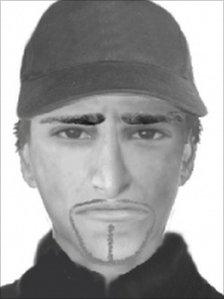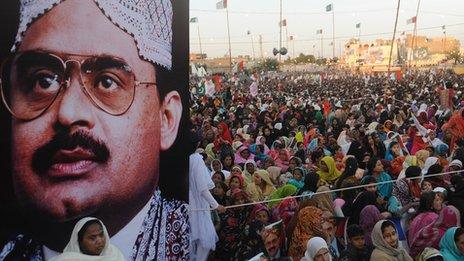Imran Farooq murder: Two men sought by UK authorities
- Published
Owen Bennett-Jones reports into the developments in the case of Imran Farooq's murder
UK prosecutors have asked Pakistan to trace two suspects believed to have been involved in the 2010 murder of Imran Farooq, a senior leader of the Muttahida Qaumi Movement (MQM).
He was stabbed outside his home in Edgware, London, close to the Pakistani political party's international HQ.
Documents obtained by BBC Newsnight name the suspects as Mohsin Ali Syed and Mohammed Kashif Khan Kamran.
They are believed to be in Pakistani custody but not under formal arrest.
The investigation into Mr Farooq's murder has seen more than 4,000 people interviewed, but so far the only person arrested in the case has been Iftikhar Hussain, the nephew of MQM's London-based leader Altaf Hussain.
Student places
Iftikhar Hussain was arrested on suspicion of conspiracy to murder, but is now on police bail. It is an arrest the party says was based on wrong information.
MQM senator Farogh Naseem has described Iftikhar Hussain as "not a person who is really with himself mentally". He said Iftikhar Hussain had suffered at the hands of the Pakistani authorities.
In November 2011 - 14 months after the murder - Metropolitan Police chief Bernard Hogan-Howe said his force was liaising with Pakistani authorities over two arrests believed to have been made in Karachi.
Since then, however, the force has refused to confirm or deny that it is seeking Pakistani assistance.
The Pakistani government has denied anyone has been arrested and officials have failed to respond to questions about the request from the UK's Crown Prosecution Service.
The documents, obtained by Newsnight from official sources in Pakistan, suggest Mohsin Ali Syed and Mohammed Kashif Khan Kamran secured UK visas on the basis of being granted admission to the London Academy of Management Sciences (LAMS), in east London.
The documents name two other men. One is Karachi-based businessman Muazzam Ali Khan, of Comnet Enterprises, who is believed to have endorsed the suspects' UK visa applications and was in regular contact with Iftikhar Hussain throughout 2010.

In 2011, police released an e-fit image of a suspect in the murder case
The other is Atif Siddique, an educational consultant in Karachi, who is believed to have processed them.
Atif Siddique said he was not the agent of LAMS and did not know the two suspects.
Mr Ali Khan has not responded to e-mails and phone calls offering him the chance to respond.
A director of the college, Asif Siddique - Atif Siddique's brother - has confirmed the two students were meant to study there. One of them registered, but failed to attend.
LAMS is designated as a "highly trusted" partner of the UK Border Agency, which means it is supposed to report the non-attendance of students within 10 days of the 10th missed student encounter with staff. Asif Siddique said the college had reported one of the student's non-attendance to the UK authorities in May 2012.
'Under surveillance'
The Home Office has refused to say whether or not it believes LAMS broke the rules for reporting non-attendance, but has said it is not currently investigating the college.
Mohsin Ali Syed, in his late 20s, arrived in the UK in February 2010. He moved between a number of London addresses, including bedsits in Tooting, in south London, and Whitchurch Lane, in Edgware.
Mohammed Kashif Khan Kamran arrived in the UK in early September 2010. Phone records indicate the two moved around together and it is believed they kept Mr Farooq under surveillance.

Altaf Hussain has widespread support in Karachi but is based in Edgware
The murder weapons were left at the scene of the crime and the documents seen by Newsnight state that the British authorities are seeking DNA samples as evidence that could be used in a British court.
Records show that both men left the UK on 16 September 2010, a few hours after the murder had happened, and flew to Sri Lanka, and then on to Karachi on the 19 September.
According to immigration officials in Pakistan, security officials picked them up on the tarmac before they left Karachi airport. Pakistani security sources deny that the men were picked up as a result of a British tip-off.
Whereabouts unknown
Documents lodged with Sindh High Court refer to another man, Khalid Shamim, who is believed to have helped the two suspects return to Pakistan. His wife has started legal proceedings in the court in an attempt to trace his whereabouts.
The MQM, Karachi's dominant political party, describes itself as a modern, secular and middle class party. Senior party figures say it offers the best chance of opposing the rise of the Taliban in Pakistan's largest city.
It insists it is a peaceful party, but its opponents complain that the UK allows it to use London as a safe haven from which it can organise its violent control of Karachi.
The party says it wants to co-operate with the murder inquiry, but insists it has nothing to do with the case and accuses UK police of harassment.
Last month, Altaf Hussain complained police were making his life "hell".
Watch Owen Bennett-Jones's investigation in full on Newsnight on Wednesday 29 January at 22:30 on BBC Two, and then afterwards on the BBC iPlayer.
- Published16 September 2013
- Published11 July 2013
- Published17 September 2010
- Published11 July 2013
- Published16 May 2013
- Published16 September 2011
- Published17 September 2010